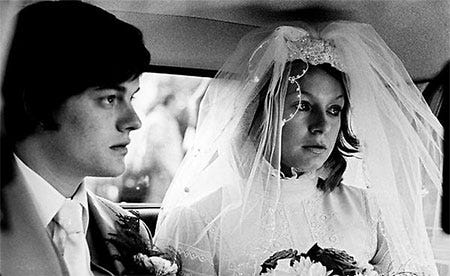
If anything is a big influence on me, it’s David Lynch. He’s really into presenting something but not explaining it. It’s just ‘This is an image, this is an idea, isn’t it cool?’ — Black Francis
Art is a strange place for a teen, which is often the point. There is the budding inclination to look for *something else*. You can get stuck in the infinite searching trap, looking for what’s next or what’s weird, and gradually congeal into the much-maligned hipster. Or you can follow the promise of art and find something that speaks to you – or shows you something you need to see.
As an arty kid in the 80s, one saw Eraserhead. I was probably in jr. high. The radiator song was cool, but none of the movie made much sense and the relationship dynamics made me uncomfortable. As a teenage girl I was drawn to alt/punk culture but simultaneously yearned for stable, old-fashioned male figures (it was a very painful time). Was the movie meaningful? Was it just cool? I didn’t know. Most kids probably didn’t care. I would agonize over stuff like that. I didn’t want to be too dumb to get it, but I didn’t want to be a sucker if there wasn’t anything there.
I think I eventually judged it as weird for weird sake, but in a kinda cool way. At 14 or so I was pretty sure I understood most things and I didn’t understand that. I saw another Lynch movie or two over the years got the sense he was saying *something*. It wasn’t totally off-putting like Harmony Korine, but it wasn’t really my thing.
Then at some point in my 30s, Eraserhead was on TCM. So I started watching it. And strangely, it didn’t seem strange at all. Having nothing personally invested in it, it just felt like a straightforward story of a guy who got his girlfriend pregnant too soon. He suddenly had to face marriage and parenthood when he was just discovering himself and women. He felt horrified and trapped. It was stylized in that way the ’70s avant garde was into the kitsch of the ’50s – the Cold War pessimism, the squareness (perhaps a twisted childhood nostalgia). And it was completely exaggerated and over the top. But the story itself suddenly seemed so uncomplicated. I guess the surreality made it larger than life, or bearably interesting to one living through it.

I had recently viewed Anton Corbijn’s Ian Curtis biopic Control. Curtis was in a similar predicament, though tragically lacking Lynch’s humor or perspective. A narrative began to emerge about men in the late ’60s to ’70s. Before then, the trajectory for men was to get married after school. Inevitably, children appeared and jobs (often uninteresting and long-term) were required to support them. But by the ’80s, certainly by the ’90s, prolonged adolescence resulted in men living on their own or with friends after time in college. They took more time to figure stuff out or mess around before settling down. However, some inevitably got stuck in this man-boy purgatory. Granted, many still do out of circumstance or upbringing, but forced manhood via domesticity upon graduation is not a given like it once was. I thought of old pictures of my dad from when I was a baby. He wore snap western shirts and jeans – looking like hipsters I hung out with at bars a few years previous. I wondered what he was going through then.
The film got me thinking. I looked up online discussions. Most articles went on about innovations in horror imagery and sound, or spoke broadly about sexual themes or post-apocalyptics landscapes. Some saw Jesus allegories. Not finding any satisfying discussion, I looked up Lynch’s bio.
David Keith Lynch got married in 1967 while in art school to his pregnant girlfriend and had a daughter the following year born with severely clubbed feet. They moved to a filthy, high-crime neighborhood in Philadelphia. Lynch took up a job in print engraving. He would record his crying baby and distorted the sound for a short film. They all moved to LA where filming for Eraserhead began in 1972. At times he lived on the set at Greystone Mansion away from his wife. He got interested in spirituality. They filed for divorce in 1974. After financing problems and various starts and stops, Eraserhead was completed in 1976.
I can see why he doesn’t like to explain his work. Not because it’s mysterious, vacuous, inexplicable or too-cool, but because it’s mundane and raw and personal and multi-layered. You can’t always explain feelings in words without being clumsy, incomplete, and in the case of this story, without sounding like a total dick. The protagonist is not heroic. The film is a brutal art-punk rejection of family, sentimentality and traditional male responsibility but via an emotional, conflicted character.
Films seem so big. They’re so immersive and otherworldly. They’re expensive and take a lot of people and planning. But in those rare cases when they aren’t derailed by compromise, bullshit, or insecure adherence to formula, you realize it’s just people telling their stories or materializing their ideals in a style they like – trying to make their little stories feel as big and strange and horrifying and beautiful as it does to them to get you to care. Eventually it wasn’t the inscrutability that drew me in to Eraserhead, or even what Lynch had to say. But his manifestation of communicating complicated things with other humans in new ways ended up being kinda cool.
No comments yet.